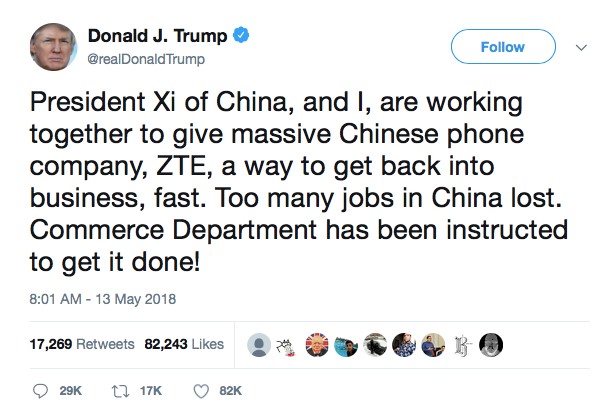According to the U.S. administration, Chinese tech giant ZTE violated sanctions by selling equipment to Iran and North Korea. In April, this led to a ban on U.S. companies selling to ZTE—a move that would cripple the Chinese company. This week, Trump reversed that decision in what he describes as part of a negotiation for a larger trade deal.
The sudden about-face is in line with Trump’s pattern of attempting to gain leverage, bringing things to a fever pitch and then re-negotiating—but this time we’re talking about a major national security threat, and the trade-off is more exports.
Almost exactly a year ago, ZTE agreed to plead guilty and pay nearly $900 million for U.S. sanctions busting. This was the culmination of a five-year investigation into the tech equipment maker, which conspired to evade U.S. embargoes by buying U.S. components, incorporating them into ZTE equipment and then illegally selling them to Iran and North Korea.
In other words, they were getting sensitive American technology to hostile regimes.
There is no question that ZTE was, and still represents, a threat to national security. It was the most obvious target in a trade war that has been strongly focused on China’s theft of American technology secrets.
And as the Wall Street Journal notes, “U.S. concerns about ZTE go beyond its evasion of sanctions. For years, the U.S. has accused equipment made by Shenzhen-based ZTE and its larger crosstown rival Huawei Technologies Co. of being a national security threat, an accusation that both companies have denied. The U.S. has largely blocked both companies from selling telecommunications gear in the U.S.”
For this reason, the sudden promise by Trump to help ZTE out of a major bind that would likely have brought it to its knees is perplexing.

(Click to enlarge)
Trump insists that it is part of negotiations for a larger trade deal, suggesting that the U.S. is going to get something big in return (presumably the U.S. as a nation, not the Trump Organization), but details have been vague at best. And it would have to be something big, indeed, if the administration is simply going to ignore sanctions violations with rogue regimes like Iran and North Korea, especially given that Washington is again on the sanctions warpath with the former.
Now that ZTE is facing bankruptcy, Trump is promising to turn things around because “too many jobs in China [will be] lost”.

(Click to enlarge)
So now, suddenly, Washington is ostensibly worried about Chinese jobs rather than American jobs, and Trump’s sudden reversal led to some serious blowback.

(Click to enlarge)
The senator followed that up later with this statement: “The toughest thing we could do, the thing that will move China the most, is taking tough action against actors like ZTE. But before it’s even implemented, the president backs off. This leads to the greatest worry, which is that the president will back off on what China fears most – a crackdown on intellectual property theft – in exchange for buying some goods in the short run. That’s a bad deal if there ever was one.”
The issue intensified on Tuesday and Wednesday, when media reports emerged about a Chinese loan for a Trump Organization project in Indonesia.
Last Thursday, China’s state-own MCC Group construction company announced it had formalized plans to develop a theme part in Lido, Indonesia in part of a project for which the Trump Organization has licensing agreements, CNN reported. On May 11, the Indonesian project got a $500-million development loan from MCC, right before Trump’s ZTE reversal.
The issue here is that the Trump Organization will benefit from the project though, though not directly, and only some of this will go to facilitate the construction of Trump-branded properties here. Related: Iran Looks To Bitcoin As Rial Tumbles
Trump has branded it all ‘fake news’, and the story itself hasn’t gained significant traction, largely because regardless of whether or not the deal in Indonesia is a blockbuster for the Trump Organization or not and represents a conflict of interest, the likelihood is that the Chinese realize this sweetens the deal, but it’s not at the heart of the negotiations.
The problem is that ZTE is a national security threat and flip-flopping on this without anyone knowing why makes it seem that we’re not getting the upper hand in this trade deal. It also leads many to question Trump’s ability to strategize beyond the immediate term.
As the Financial Times put it: “If Mr Trump has bargained away a serious threat to US national security for some short-term gimmicks from Mr Xi such as ordering Chinese state-owned companies to buy more American exports, it is one of the worst deals he has ever struck. It is entirely possible that Mr Trump will quickly U-turn on his U-turn, particularly if he does not quickly get what he wants on trade from Mr Xi.”
China is definitely desperate for a deal on ZTE. So from that perspective, Beijing is probably willing to negotiate. China has already said it was “willing in principle” to import more U.S. agricultural products in return for an easing of penalties on ZTE.
The question then, in other words, is: should the U.S. be willing to risk national security for the sake of exports? We’ll find out more this week as Chinese officials continue trade talks in the U.S.
By Fred Dunkley for Safehaven.com
More Top Reads From Safehaven.com:
















